China says executives of state firms will be judged on stock performance
Guidelines affect 409 mainland-listed companies with a combined market value of US$3.8 trillion

The guidelines come at a time when a rebound in Chinese stocks is fizzling out and authorities are eager to boost the values of yuan-denominated shares. Investors have lately been frustrated by a lack of clarity on what Beijing plans to do to support the stock and property markets – as well as the broader economy.
Sasac’s latest guidelines are also a response to the high-level central economic work conference that concluded last week. At the gathering, President Xi Jinping and other top leaders called for a stabilisation in the stock and property markets.
“The listed companies controlled by central state-owned enterprises are the main participants that compete in the market and are also an important force in stabilising the capital market,” Sasac said. “We need to have high-quality development as a prerequisite, steadily improve efficiency and profitability and build a batch of first-tier listed companies with solid business performances, strong innovation capability and good corporate governance.”
